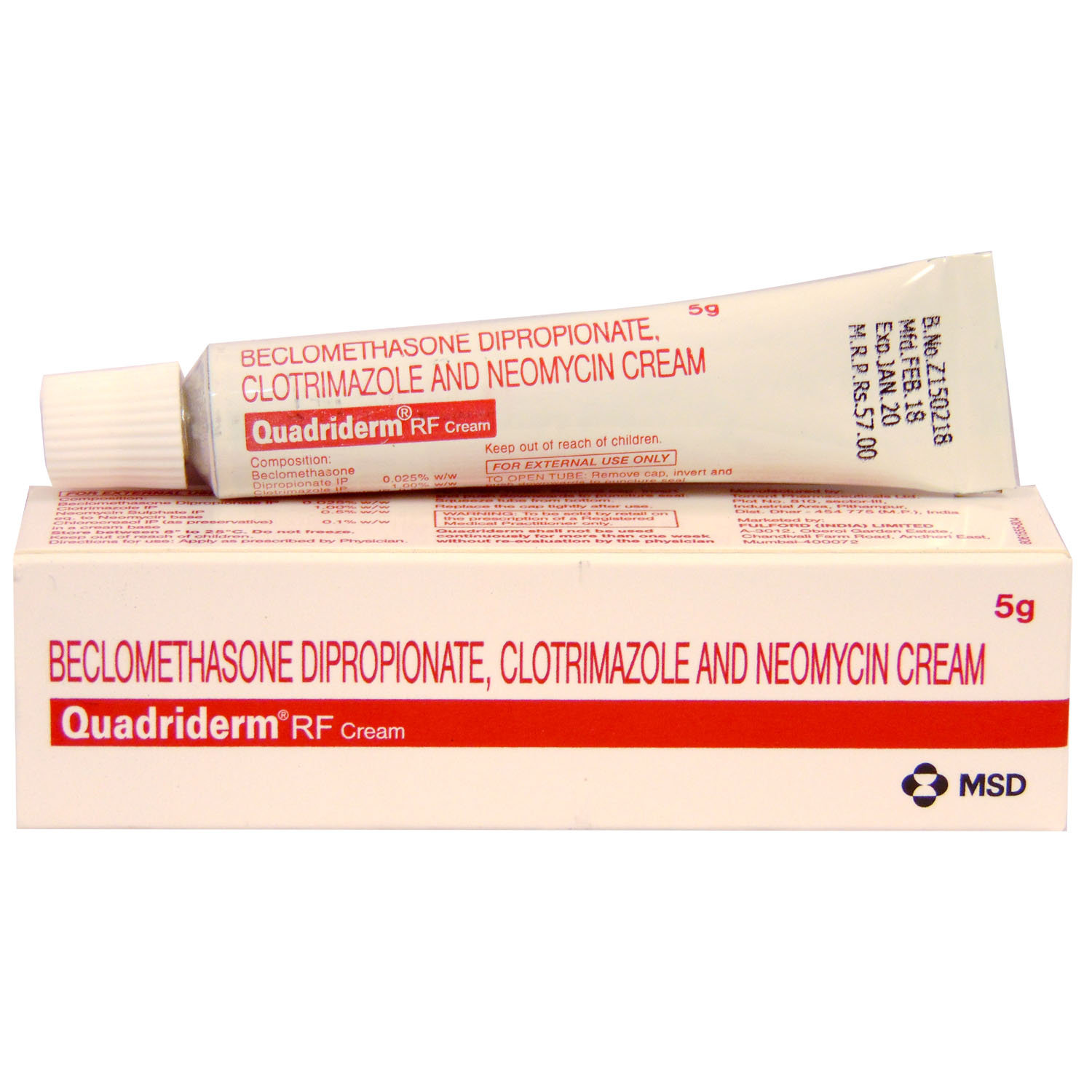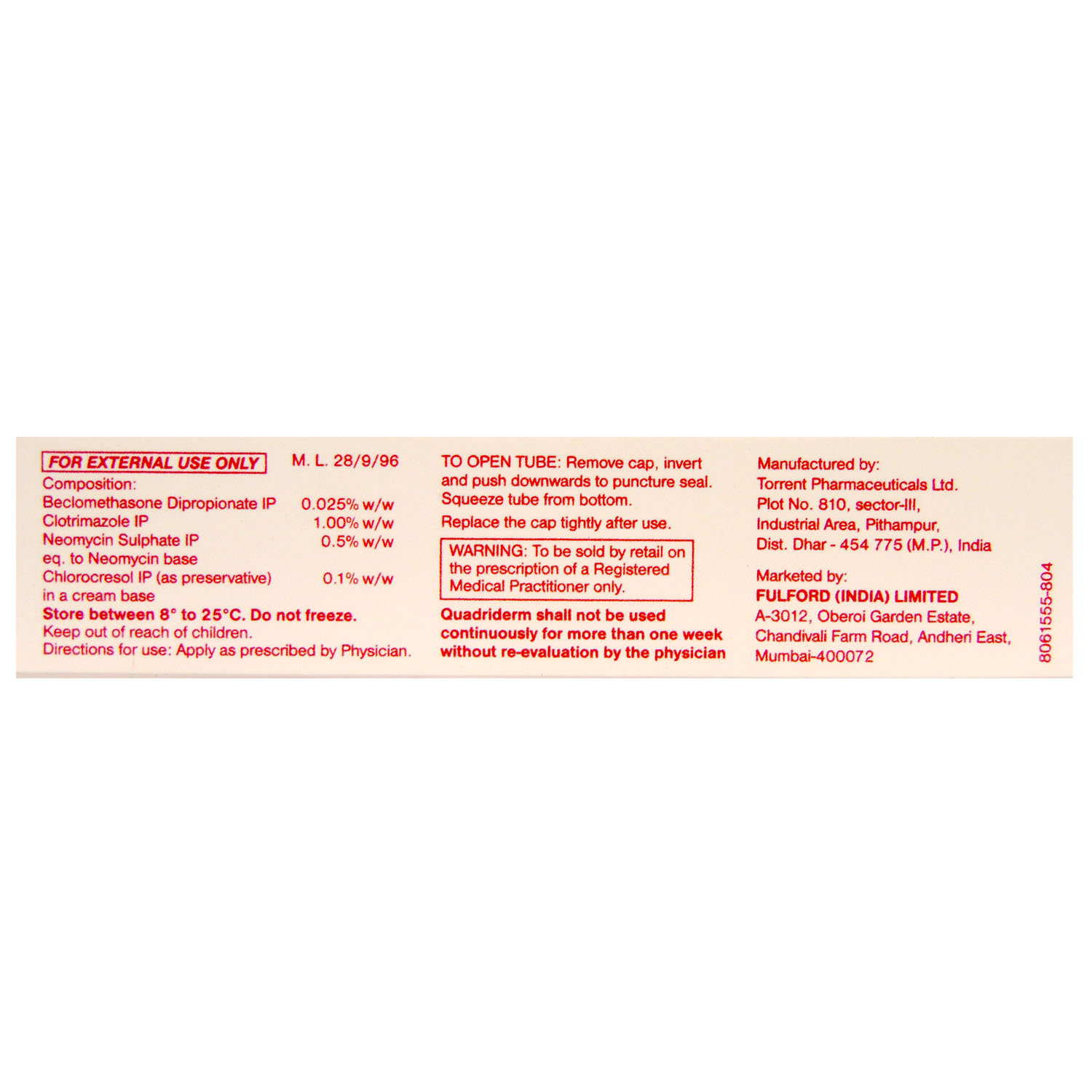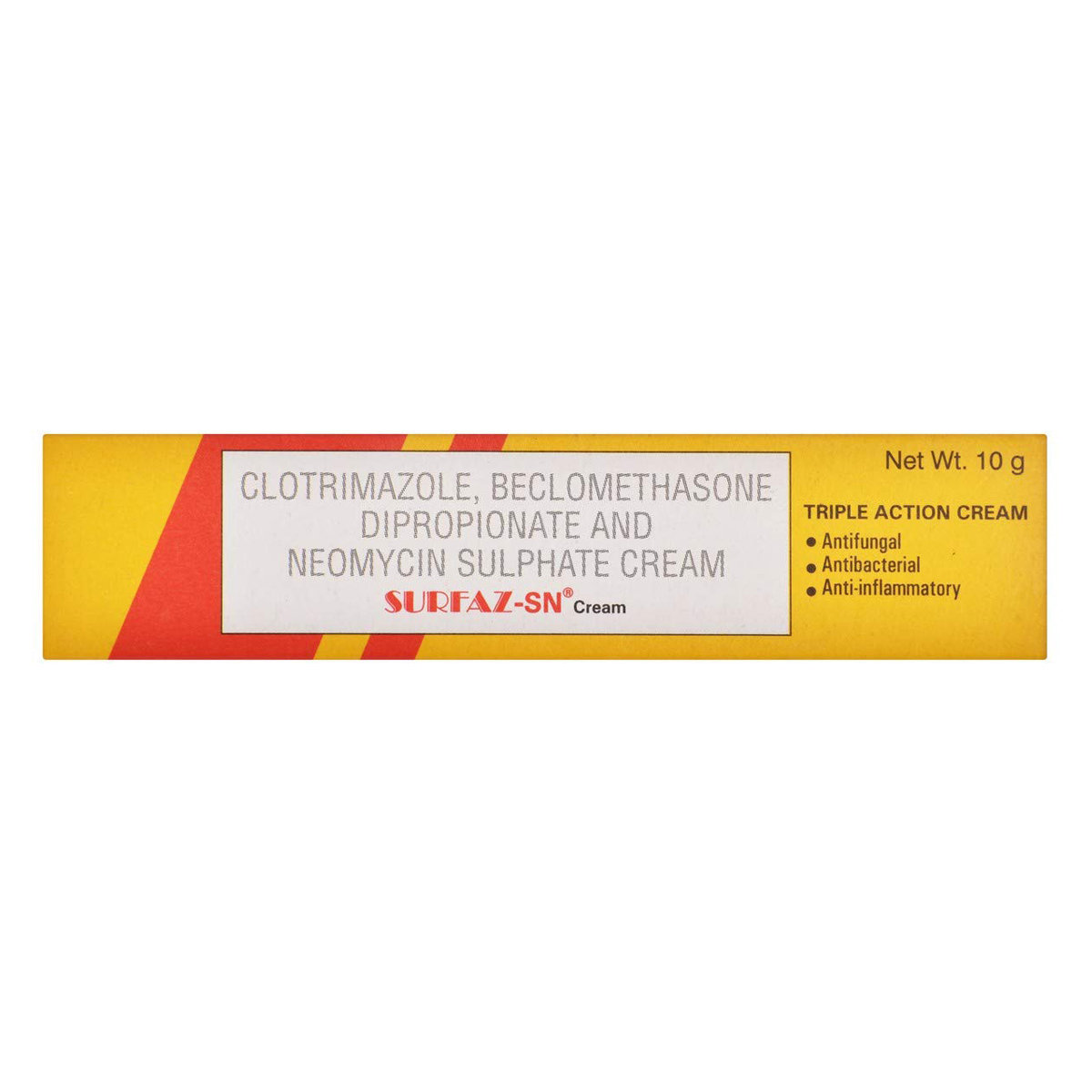Quadriderm RF Cream 5 gm
MRP ₹83
(Inclusive of all Taxes)
₹12.4 Cashback (15%)
Selected Pack Size:5 gm
5 gm ₹74.7
(₹14.94 per gm)
In Stock
10 gm ₹140
(₹14.0 per gm)
In Stock
Provide Delivery Location
Online payment accepted
 Prescription drug
Prescription drugWhats That
Manufacturer/Marketer :
Consume Type :
Expires on or after :
Return Policy :
About Quadriderm RF Cream 5 gm
Quadriderm RF Cream 5 gm is a combination of medicine primarily used to treat various fungal and bacterial skin infections. It treats skin inflammation due to allergies or irritants, eczema (inflamed, itchy, cracked and rough skin patches), psoriasis (skin cells multiply rapidly to form bumpy (uneven) red patches covered with white scales), ringworm, athlete’s foot (fungal infection between the toes), jock itch (fungal infection in the skin of the genitals, inner thighs and buttocks), insect bites, and stings. Bacterial infection occurs when harmful bacteria grow in the body and causes infection. Fungal infection is caused when a fungus invades and affects the tissue on the skin.
Quadriderm RF Cream 5 gm is composed of three medicines: Clotrimazole (antifungal), Neomycin (antibiotic) and Betamethasone (steroid). Clotrimazole is an antifungal medication that stops the growth of fungi by causing damage and leakage to the fungal cell membrane. Neomycin is an aminoglycoside antibiotic used in treating bacterial and fungal infections of the skin. It prevents the synthesis of essential proteins required by bacteria to carry out vital functions. On the other hand, Betamethasone is a corticosteroid and blocks prostaglandin's production (chemical messengers) that make the affected area red, swollen and itchy.
Quadriderm RF Cream 5 gm is for topical (for skin) use only. If the medicine gets into your eyes, nose or mouth, rinse with cold water. Common side effects of Quadriderm RF Cream 5 gm include burning, irritation, itching and redness at the application site. These side effects do not require medical attention and gradually resolve over time. However, if the side effects are persistent, please consult your doctor.
Do not use topical Quadriderm RF Cream 5 gm on open wounds, blisters and lesions. Quadriderm RF Cream 5 gm is not for oral, ophthalmic (eye) or intravaginal use. Do not put a dressing or bandage on the affected area unless prescribed. Please check with your doctor before using Quadriderm RF Cream 5 gm, if you have dehydration problems, cataracts or glaucoma, diabetes, gastrointestinal diseases, osteoporosis (weak and brittle bones), or muscle weakness, liver and kidney diseases. Pregnant and breastfeeding mothers should consult the doctor before starting Quadriderm RF Cream 5 gm.
Uses of Quadriderm RF Cream 5 gm
Directions for Use
Key Benefits
Quadriderm RF Cream 5 gm comprises of Clotrimazole, Neomycin, and Betamethasone. Clotrimazole is an antifungal medication that stops the growth of fungi by causing damage and leakage to the fungal cell membrane. Neomycin is an aminoglycoside antibiotic and treats bacterial and fungal infections of the skin. It prevents the synthesis of essential proteins required by bacteria to carry out vital functions and has broad-spectrum activity against aerobic Gram-positive and Gram-negative bacteria. Betamethasone is a corticosteroid and blocks prostaglandin's production (chemical messengers) that make the affected area red, swollen and itchy. With its anti-inflammatory and vasoconstrictive properties, Betamethasone treats eczema, psoriasis and dermatitis.
Storage
- Burning sensation is an abnormal side effect that needs medical attention. To relieve the burning feeling, your doctor may prescribe painkillers or antidepressants.
- Focused exercises can improve strength and reduce burning by soothing muscles.
- Change in lifestyle and improving nutrition can reduce the causes of burning sensation and provide relief.
- Your doctor may suggest nerve block injections as it is related to sensation in the skin.
- Burning feeling in a specific area would need mild electrical currents to reduce pain that targets the nerve affected. This practice must be done only if your doctor mentions it.
- Consult your doctor if you experience skin redness, itching, or irritation after taking medication.
- Apply cool compresses or calamine lotion to the affected skin area to reduce irritation.
- Stay hydrated by drinking plenty of water to help alleviate symptoms and keep your skin soothing.
- Monitor your skin condition closely and promptly report any changes, worsening symptoms, or concerns to your healthcare provider.
- Report the itching to your doctor immediately; they may need to change your medication or dosage.
- Use a cool, damp cloth on the itchy area to help soothe and calm the skin, reducing itching and inflammation.
- Keep your skin hydrated and healthy with gentle, fragrance-free moisturizers.
- Try not to scratch, as this can worsen the itching and irritate your skin.
- If your doctor prescribes, you can take oral medications or apply topical creams or ointments to help relieve itching.
- Track your itching symptoms and follow your doctor's guidance to adjust your treatment plan if needed. If the itching persists, consult your doctor for further advice.
- If you experience burning or stinging sensations and suspect that they may be related to medication, consult a doctor or healthcare expert to determine the cause and best course of treatment.
- Avoid harsh products, extreme temperatures, and other potential irritants that may exacerbate burning or stinging.
- Your healthcare professional may recommend applying a soothing or protective agent, such as a cream, gel, or ointment, to help alleviate burning or stinging.
- Follow your healthcare professional's advice on how to care for the affected area, as gentle cleaning and care instructions may vary depending on the location and severity of the burning or stinging.
- Schedule follow-up appointments with your doctor to monitor your symptoms and adjust your treatment plan as needed. If the burning or irritation persists or worsens, seek medical attention.
Drug Warnings
Before using Quadriderm RF Cream 5 gm, let your doctor know if have a history of dehydration problems, cataract or glaucoma, diabetes, gastrointestinal diseases, osteoporosis (weak and brittle bones), muscle weakness, liver and kidney diseases or allergic reactions to steroid medicines and antibiotics. Avoid smoking or going near naked flames since Quadriderm RF Cream 5 gm can catch fire and burn easily. Avoid applying Quadriderm RF Cream 5 gm cream on sunburns, lesions, blisters and open wounds. Quadriderm RF Cream 5 gm is not for oral, ophthalmic (for the eye) or intravaginal use. Do not wash the treated areas for a minimum of 3 hours after you apply Quadriderm RF Cream 5 gm. Let your doctor know if you plan to become pregnant or are already pregnant and a lactating mother.
Drug-Drug Interactions
Drug-Drug Interactions
Login/Sign Up
Drug-Food Interactions
Drug-Food Interactions
Login/Sign Up
Diet & Lifestyle Advise
- Use mild soap while taking baths and prefer warm baths.
- Always wear loose-fitting clothes to avoid further sweat and the spread of the fungal infection.
- Regularly change your socks and wash your feet. Avoid shoes that make your feet sweaty and hot.
- Do not walk barefoot at places like gym showers to prevent fungal and bacterial infections.
- Do not scratch the affected area of the skin as it can spread the infection to other body parts.
- Avoid sharing towels, combs, bedsheets, shoes or socks with others.
- Wash your bed sheets and towels regularly.
- Avoid or limit the intake of alcohol and caffeine.
- Manage stress, eat healthily, drink plenty of water, exercise regularly and get plenty of sleep.
Side Effects of Quadriderm RF Cream 5 gm
- Burning
- Irritation
- Itching
- Redness at the application site
Habit Forming
Therapeutic Class
All Substitutes & Brand Comparisons
RX
Out of StockOstoderm G Cream
₹48
(₹2.16/ 1gm)
85% CHEAPERRX
Out of StockGerasil Skin Cream
₹64.9
(₹2.92/ 1gm)
80% CHEAPERRX
Out of StockCandidac BN Cream
Ikon Remedies Pvt Ltd
₹74.5
(₹4.47/ 1gm)
70% CHEAPER
Author Details
We provide you with authentic, trustworthy and relevant information
Drug-Diseases Interactions
Drug-Diseases Interactions
Login/Sign Up
FAQs
Special Advise
It is advised to reach out to your doctor if the bacterial/fungal infection symptoms persist or worsen after two weeks of treatment.
Disease/Condition Glossary
Bacterial skin infection: It occurs when bacteria enter the body through the skin. Bacterial skin infections are generally mild and can be treated using topical antibiotics. Few infections need treatment using an oral antibiotic. Symptoms of a skin infection include rashes, blisters, cracked/dry skin, itching, redness, swelling, stinging or burning sensation.
Fungal skin infection: It is a skin disease in which a fungus attacks the tissue and causes infection. Fungal infections may be contagious (spread from one person to another). The symptoms of a fungal infection include scaly skin, blisters, itching, swelling, irritation, and redness.

Have a query?
Alcohol
Safe if prescribed
No interactions were found/ established. Please consult your doctor before using Quadriderm RF Cream 5 gm.
Pregnancy
Consult your doctor
There is limited data on how the Quadriderm RF Cream 5 gm affects pregnancy. Please consult your doctor if you are planning to become pregnant or are already pregnant before starting Quadriderm RF Cream 5 gm.
Breast Feeding
Consult your doctor
Please consult your doctor before using Quadriderm RF Cream 5 gm if you are breastfeeding. If you need to apply the cream or ointment on your breasts, don't do this shortly before giving a feed.
Driving
Safe if prescribed
Quadriderm RF Cream 5 gm has no or negligible influence on the ability to drive or use machines.
Liver
Consult your doctor
Let your doctor know if you have any history of liver diseases or hepatic impairment before starting Quadriderm RF Cream 5 gm.
Kidney
Consult your doctor
Let your doctor know if you have any history of kidney diseases before starting Quadriderm RF Cream 5 gm.
Children
Safe if prescribed
Quadriderm RF Cream 5 gm is recommended for children only with a doctor's advice.












